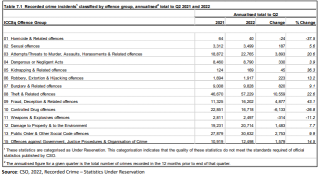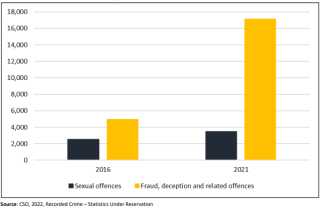Towards Wellbeing For All - Safety and Security

The Programme for Government acknowledged that our “existing measures of economic performance fail to measure matters such as damage to the environment and voluntary work. They also overlook equality of opportunity, distribution of wealth and income and only value public expenditure on the basis of the inputs used, not the outcomes achieved” and committed to introducing a series of indicators that would more accurately measure wellbeing to provide a “holistic view of how our society is faring”.
A ‘Wellbeing Dashboard’ was then developed to provide a snapshot of progress. In developing the Dashboard, the Inter-Departmental Working Group established a list of 35 indicators chosen to be balanced, add value or be of policy relevance, provide for aggregation and dis-aggregation, be readily available and of sufficient quality, and be internationally comparable.
So how are we doing? To gauge public opinion on what matters, and what should therefore be counted as an indicator of Well-being, Social Justice Ireland produced a survey asking people to rank a set of six indicators under each of the Well-being Framework dimensions from one to six, with one being the least important and six being the most important. The six indicators included the indicators used in the Dashboard and datasets readily available from the CSO and other reputable sources. This survey was circulated over the Summer months through our social media channels, our Weekly Digest, and our Members Bulletin. What follows is based on the responses to this survey and our policy proposals under each of the 11 dimensions.
There is no standard recording of “gender-based violence”, however the number of recorded crime instances related to sexual offences increased by 38.5 per cent between 2016 and 2021 (from 2,521 to 3,491), while Fraud and Theft Offences, including financial control, increased by 247 per cent (from 4,972 to 17,122). In a European context, data available from the European Institute of Gender Equality indicates that Ireland ranked 9th for the number of sexual assaults on women in 2021 and 6th for rape.
The most prevalent type of crime (“offence group”) reported in the latest statistics was Theft & Related Offences, with 57,229 offences in the year to Q2 2022 and an increase of 22.6 per cent on the previous year.[1] Of the 14 offence groups detailed in the CSO release, just three have decreased between Q2 2021 and Q2 2022: Homicide & Related Offences (-37.5 per cent); Controlled Drug Offences (-26.8 per cent); and Weapons and Explosives Offences (- 11.2 per cent). All other offence groups increased in the period, with the highest proportionate increase reported in Fraud, Deception and Related Offences (43.1 per cent). Reported cases of fraud, mostly cases of unauthorised transactions and attempts to obtain personal or banking information online or by phone, more than doubled to 16,929 by the end of 2021. (Table 1 and Chart 1)

Chart 1: Sexual Offences and Fraud, Deception and Related Offences, 2016 to 2021

There has been a 50 per cent increase in the proportion of the population who experienced discrimination between Q1 2014 and Q1 2019. With non-Irish nationals, people from religions other than Roman Catholic, and the unemployed experiencing higher levels than the general population. The reduction in the number of people killed on the roads between 2014 (192) and 2019 (140) has decreased, while the number injured has remained relatively static.
Policy Priorities
- Following our ratification of the Istanbul Convention, Ireland is obligated to have 472 places for victims of DSGBV, however we are falling far short of this target.
- The Programme for Government referred to an “epidemic” of domestic abuse. But as like any epidemic, adequate resources are needed to combat it. Government must meet their commitments under the Istanbul Convention and provide further refuge spaces for victims of Domestic Sexual and Gender-Based Violence.
- Fully implement the recommendations of the Commission for the Elimination of Racial Discrimination within a reasonable timeframe.
- Fully implement the recommendations of the 2019 Trafficking in Persons Report.
- As more and more make the move to online and digital money services, especially those who may be unused to using these services, effective education and fraud prevention measure must be enhanced.
[1] https://www.cso.ie/en/releasesandpublications/ep/p-rc/recordedcrimeq220…